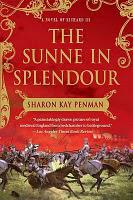 Elizabeth Woodville, a young Lancastrian widow, armed only with her beauty and her steely determination, seduces and marries the charismatic warrior king, Edward IV of York.Crowned Queen of England, surrounded by conflict, betrayal and murder, Elizabeth rises to the demands of her position, fighting tenaciously for her family's survival. Most of all she must defend her two sons, who become the central figures in a mystery that has confounded historians for centuries: the missing Princes in the Tower.
Elizabeth Woodville, a young Lancastrian widow, armed only with her beauty and her steely determination, seduces and marries the charismatic warrior king, Edward IV of York.Crowned Queen of England, surrounded by conflict, betrayal and murder, Elizabeth rises to the demands of her position, fighting tenaciously for her family's survival. Most of all she must defend her two sons, who become the central figures in a mystery that has confounded historians for centuries: the missing Princes in the Tower.Set in the tumult and intrigue of the Wars of the Roses, The White Queen is the first novel in a series about the Plantagenets. In the same series, The Red Queen (Margaret Beaufort, Henry VII's mother) and the latest one, The Lady of the Rivers (Elizabeth's Woodville's mother) .
 I bought The White Queen in a lovely second-hand shop in Winchester, when I was there in July and I was so happy I had added a new one to my War of the Roses bookshelf. In my Ricardian enthusiasm, after reading Sharon Kay Penman's "The Sunne in Splendour", I promised myself to read as much as I could about that period and about vilified king Richard III. And second came, "The Daughter of Time" by Josephine Tey, which was great fun to read. Third was "The Virgin Widow" by Anne O'Brien and I loved it.
I bought The White Queen in a lovely second-hand shop in Winchester, when I was there in July and I was so happy I had added a new one to my War of the Roses bookshelf. In my Ricardian enthusiasm, after reading Sharon Kay Penman's "The Sunne in Splendour", I promised myself to read as much as I could about that period and about vilified king Richard III. And second came, "The Daughter of Time" by Josephine Tey, which was great fun to read. Third was "The Virgin Widow" by Anne O'Brien and I loved it. I was aware that, in this case, being Elizabeth Woodville's story, I would be reading the facts and events I was interested in from the point of view of one of Richard's antagonists and rivals, a woman who never liked him and whom he never liked. So, of course, I didn't expect an idillic relationship between the two in this novel. Frankly, I wouldn't have accepted any take different from rivalry, nor any characterization of Richard Plantagenet which was not negative. It wouldn't have been plausible from Elizabeth Woodville's eyes. Anyway, its not being pro-Richard III is not the reason why I didn't like this book very much.I haven't read anything else by Philippa Gregory (well I saw two different adaptations of her "The Other Boleyn Girl", actually, and wrote about them HERE) this was my first approach to her widely popular work and I can't compare this one with any other novel of hers. Unfortunately, while I was reading it, Ms Gregory's White Queen had to struggle with my huge enthusiasm and my admiration for “The Sunne in Splendour” and I don't deny her heroine and book have come out defeated.
I was aware that, in this case, being Elizabeth Woodville's story, I would be reading the facts and events I was interested in from the point of view of one of Richard's antagonists and rivals, a woman who never liked him and whom he never liked. So, of course, I didn't expect an idillic relationship between the two in this novel. Frankly, I wouldn't have accepted any take different from rivalry, nor any characterization of Richard Plantagenet which was not negative. It wouldn't have been plausible from Elizabeth Woodville's eyes. Anyway, its not being pro-Richard III is not the reason why I didn't like this book very much.I haven't read anything else by Philippa Gregory (well I saw two different adaptations of her "The Other Boleyn Girl", actually, and wrote about them HERE) this was my first approach to her widely popular work and I can't compare this one with any other novel of hers. Unfortunately, while I was reading it, Ms Gregory's White Queen had to struggle with my huge enthusiasm and my admiration for “The Sunne in Splendour” and I don't deny her heroine and book have come out defeated. I usually try to be positive while reading any book or watching any film, and at the end I always find the good and the bad to notice. But this time I thought and thought and wasn't able to find anything positive to tell you. So, forgive me if for once I'll just briefly point out what I didn't like.
- I found it difficult to sympathize with the characters, especially the protagonist. You are supposed to feel for her for her several losses or admire her for her strength, the commoner who married a King and was mother to princes and to the next Queen of England. But you simply can't. You can just see her scheming, plotting and planning and never really "deeply feeling" something. Nor love, nor sorrow.
 - As I told you, I was in search of other elements to add to my Ricardian enthusiasm. But I couldn't bear to meet a confusing, contradictory characterization of Richard III's personality. I was sure I wouldn't find the Dickon of The Sunne , here but ... A Richard who was ... neither good, nor wicked? Always praying God, loyal and generous while his brother lived but terribly ambitious and greedy with Edward's heirs? What is not clear is, for instance, why Elizabeth Woodville hated him so much, didn't trust him at all but let her daughters live at court with him, saying that he took good care of them. She was sure he wasn't responsible for what had happened to her sons but still hated him deeply as if he were. Maybe I didn't catch things right (my being Italian? my being a Ricardian?) but all the sections connected to Richard III were rather puzzling to me. Maybe Ms Gregory wanted him multi-faceted and not simply a villain, that would have been good, but she did not do a great job of creating a coherent character or a coherent story for him.
- As I told you, I was in search of other elements to add to my Ricardian enthusiasm. But I couldn't bear to meet a confusing, contradictory characterization of Richard III's personality. I was sure I wouldn't find the Dickon of The Sunne , here but ... A Richard who was ... neither good, nor wicked? Always praying God, loyal and generous while his brother lived but terribly ambitious and greedy with Edward's heirs? What is not clear is, for instance, why Elizabeth Woodville hated him so much, didn't trust him at all but let her daughters live at court with him, saying that he took good care of them. She was sure he wasn't responsible for what had happened to her sons but still hated him deeply as if he were. Maybe I didn't catch things right (my being Italian? my being a Ricardian?) but all the sections connected to Richard III were rather puzzling to me. Maybe Ms Gregory wanted him multi-faceted and not simply a villain, that would have been good, but she did not do a great job of creating a coherent character or a coherent story for him. - The hypothesis - based on no historical evidence - regarding Richard, Elizabeth's younger son. She perhaps outwit her enemies and substituted another boy, a page, to her second boy so he didn't "vanish" in the Tower like his elder brother but was brought up abroad . He would then return as Perkin Warbeck, the pretender executed by Henry VII in 1499. This part didn't convince me at all.
- After a while I found the insistence on theme of Melusina - the Goddess from whom Elizabeth's mother descended - and the addition of supernatural and magic here and there rather annoying. Maybe too repetitive? r
- Finally , the terrible lack in the connotative mode makes the narration, mostly in first person, sound as if we were just TOLD and not SHOWN the story.
I really wanted to like this book and I actually did as far as p. 50, more or less. But then to get to the end required a great effort from me. I'm sure this is not Philippa Gregory at her best. I can't believe this is the quality to be expected in such a best selling author. I think I should give her another chance. Any suggestion? What should I read?
Philippa Gregory's official site

